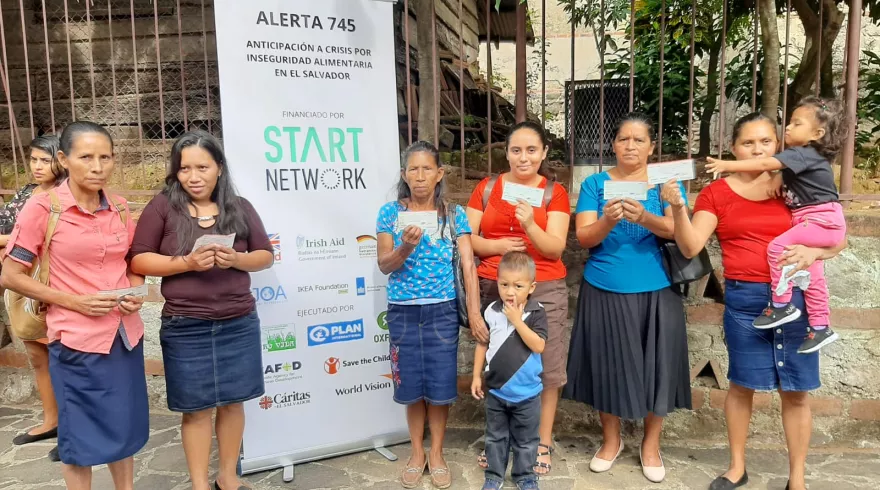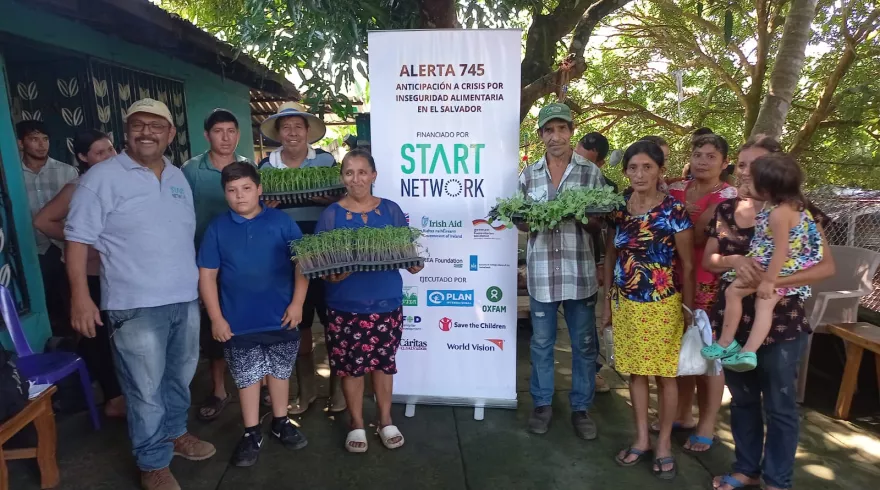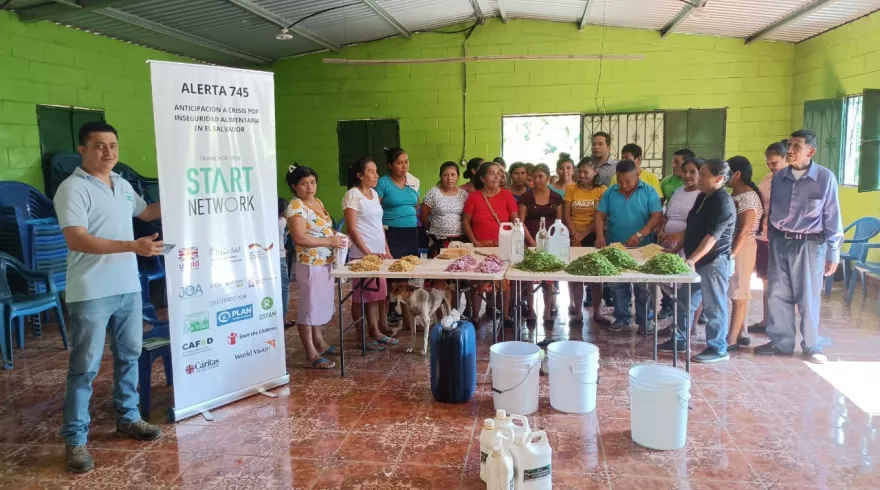Tackling Food Insecurity in El Salvador: Start Fund Alert 745
Food Insecurity in El Salvador
El Salvador faces significant food insecurity exacerbated by climate shocks, with 95% of the population living in high-risk areas such as the Dry Corridor. Recurrent droughts and floods, worsened by the El Niño, disrupt agricultural production, leading to decreased food production and increased food prices.
Across 2023, the World Food Programme estimated that 50% of small farmers in El Salvador faced difficulties in crop production, and 11% planted less than in the previous year. The UN estimated that almost a million people in El Salvador would face food insecurity in the second half of 2023, with 23% of those million people in moderate to severe food insecurity.
Start Network is a network of over 90 local, national, and international humanitarian agencies across the world. Start Network members in El Salvador had been monitoring climate projections since early 2023 and anticipated a worrying peak for food insecurity from November 2023 to January 2024. Despite existing relief efforts in the Dry Corridor to alleviate food insecurity, resources were insufficient, estimated to cover only 22% of need during the peak of the crisis.
How did the Start Fund help?
This crisis prompted members to raise a Start Fund alert in September of 2023 to act in anticipation and support the families most vulnerable to the crisis, particularly those with young children and pregnant or lactating women. The Start Fund is a funding mechanism designed by Start Network to enable NGOs to respond to under-the-radar, small to medium-scale crises in a timely and effective manner, disbursing funding within 72 hours of an alert being raised. The Start Fund is one of the fastest humanitarian mechanisms in the world.
Through the Start Fund alert raised, Start Network members were able to:
- reach 2,500 families before the peak of the crisis;
- support the most vulnerable families in 66 communities across 25 municipalities in 9 out of 14 departments in El Salvador;
- provide £289,000 in cash transfers to purchase necessities such as food, medicine, or personal hygiene articles;
- reach 4,2527 people through gender-based violence prevention workshops; and
- teach 1,353 people drought-resistant organic farming practices.

Spotlight on Locally-led Action
This alert was implemented by a consortium of six Start Network members and was led by local organisation PRO-VIDA. PRO-VIDA is a humanitarian association that focuses on improving the quality of life of the most vulnerable people in El Salvador with a focus on rights and gender. PRO-VIDA led a consortium that included international agencies Oxfam, World Vision, Plan International, Save the Children, and CAFOD. By working with a range of organisations, each with at least 15 years of experience in El Salvador, the consortium was able to reach a broad geographical area for the intervention. Being led by a local organisation allowed the consortium to focus on both long and short-term holistic approaches while empowering communities to build resilience to the possibility of food insecurity. At the same time, including international NGOs with greater resources to draw on allowed the consortium to more immediately implement activities and draw on a diverse range of expertise.
A consortium of six local and international humanitarian agencies targeted the departments and municipalities where the Humanitarian Team of the Country (EHP) estimated the effects would be the worst, including in 9 departments: Ahuachapán, Chalatenango, La Libertad, Morazán, San Miguel, San Vicente, Santa Ana, Sonsonate, and Usulután.
The implementing organisations collaborated with local authorities and communities to identify and support the most vulnerable families through unconditional cash transfers, such as those who relied on subsistence farming and/or those with pregnant or lactating mothers, young children, or elderly people. They trained local organisations and worked with the police to ensure safe and equitable distribution of cash transfers. Cash transfers were unconditional to allow families to spend the money on what was most urgent in their household. The cash vouchers provided were estimated to cover at least two weeks of basic necessities for a family in urban areas and three weeks for a family in rural areas.

A single mother in Cantarrana said in response to the cash transfers, “I haven’t had enough to buy food for my children, I am a single mother. I farm, and because of the drought that we have suffered it has been an impact. Where I normally harvest 25 quintals of corn the most I got this year was 10 quintals of corn… We are very thankful; we are going to buy food with the money. Thanks to God and all of you… we are going to buy milk, beans, and things for my family.”
A Holistic Approach
The organisations implementing the project understood that by working in a holistic way, they could help families to be more resilient to the possibility of food insecurity and the cascading problems it can create. For this reason, they also implemented an organic farming training and gender-based violence prevention campaign.
The organic farming capacity-training workshops were attended by 1,353 community members and enhanced their ability to be agriculturally resilient to drought and other climate effects. This gave farmers the chance to adapt their practices ahead of the worst of the drought.
In response to the organic farming workshops, a subsistence farmer from Cachagua said “This is an alternative that will help to improve our economic condition as farmers. These are things with the plants that we can do with things that we already have some of us in our houses. All that we were missing was the knowledge …. With this we can grow more, while also selling more to help us economically.”
Increases in gender-based violence are known to occur during times of crisis. Accordingly, a campaign and training campaign were conducted alongside the cash transfers. There was also a small media campaign highlighting women’s rights in times of crisis. The unconditional cash transfers were also targeted at women who may have experienced gender-based or family violence. By taking a more holistic approach and including gender-based violence prevention, this project not only reduced the risk of gender-based violence occurring to any families receiving assistance but also increased awareness and understanding of gender-based violence among the broader communities it reached.

The Benefit of Anticipatory Action
Working in anticipation enhanced individual and community resilience by directing resources that allowed families that were the most vulnerable to food insecurity to purchase food before the peak of the crisis. Organic farming workshops allowed community members to adapt their practices ahead of the peak of the crisis, contributing to their ability to continue to grow food despite the harsh climatic conditions. By working in anticipation, Start Network members were able to mitigate the impacts of the crisis and fill gaps in the humanitarian system. Start Network members will continue to respond, ensuring that the needs of vulnerable families in the Dry Corridor are met.
